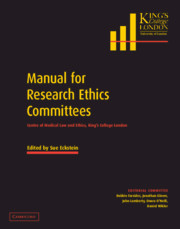Book contents
- Frontmatter
- Contents
- Editorial board
- Acknowledgements
- List of contributors
- Introduction
- Part I
- 1 The ethics of clinical research
- 2 Research ethics committees and the law
- 3 The regulation of medical research: a historical overview
- 4 The regulation of medical research in the UK
- 5 Observational and epidemiological research
- 6 Social survey research
- 7 Approaching qualitative research
- 8 Complementary and alternative medicine: challenges for research ethics committees
- 9 The ethical review of student research in the context of the governance arrangements for research ethics committees
- 10 The ethics of genetic research
- 11 Research or audit?
- 12 Randomised controlled trials
- 13 Determining the study size
- 14 Risk assessment for research participants
- 15 Absorbed radiation in patient and volunteer studies submitted to the ethical committee: a memorandum
- 16 A guide to the use of radioactive materials and radiological procedures for research purposes
- 17 Indemnity in medical research
- 18 The prevention and management of fraud and misconduct: the role of the LREC
- 19 Understanding clinical trials: a model for providing information to potential participants
- 20 The law relating to consent
- 21 Writing information for potential research participants
- 22 The law relating to confidentiality
- 23 Research involving vulnerable participants: some ethical issues
- 24 The ethics of research related to healthcare in developing countries
- Part II
- Index
22 - The law relating to confidentiality
Published online by Cambridge University Press: 08 January 2010
- Frontmatter
- Contents
- Editorial board
- Acknowledgements
- List of contributors
- Introduction
- Part I
- 1 The ethics of clinical research
- 2 Research ethics committees and the law
- 3 The regulation of medical research: a historical overview
- 4 The regulation of medical research in the UK
- 5 Observational and epidemiological research
- 6 Social survey research
- 7 Approaching qualitative research
- 8 Complementary and alternative medicine: challenges for research ethics committees
- 9 The ethical review of student research in the context of the governance arrangements for research ethics committees
- 10 The ethics of genetic research
- 11 Research or audit?
- 12 Randomised controlled trials
- 13 Determining the study size
- 14 Risk assessment for research participants
- 15 Absorbed radiation in patient and volunteer studies submitted to the ethical committee: a memorandum
- 16 A guide to the use of radioactive materials and radiological procedures for research purposes
- 17 Indemnity in medical research
- 18 The prevention and management of fraud and misconduct: the role of the LREC
- 19 Understanding clinical trials: a model for providing information to potential participants
- 20 The law relating to consent
- 21 Writing information for potential research participants
- 22 The law relating to confidentiality
- 23 Research involving vulnerable participants: some ethical issues
- 24 The ethics of research related to healthcare in developing countries
- Part II
- Index
Summary
Obligation to protect confidentiality
Those involved in clinical research owe an ethical and legal obligation to respect the confidences of research subjects. The obligation extends to all personal information, medical and other, given to or observed by the researcher in circumstances where the research subject expects it not to be disclosed. This expectation need not be explicitly stated but may be assumed from the context, e.g. it is always assumed in a physician–patient relationship, regardless of the existence of a contract between the physician and the patient. Health care professionals who disclose confidential information may be subject to disciplinary action by their professional body (e.g. the GMC or UKCC) and all researchers, whether health care professionals or not, may also be subject to legal action. Medical confidentiality is protected as part of the right to private life under Article 8(1) of the European Convention on Human Rights (Z v Finland [1997]), and consequently also under the Human Rights Act 1998.
Disclosure of information which does not reveal the identity of a research subject, e.g. epidemiological or aggregated data, is not a breach of the obligation of confidence. This is even true where anonymised patient information is sold for research purposes without the patient's consent (R v Department of Health, ex parte Source Informatics Ltd [1999]).
Exemptions from the duty of confidentiality
There are a number of exceptions to the obligation of confidentiality which may justify disclosure.
The original version of this article was written by Andrew Grubb and Ian Kennedy in 1994. The article was revised and updated by Sabine Michalowski of the Department of Law, University of Essex in 2001, who takes responsibility for its current accuracy.
- Type
- Chapter
- Information
- Manual for Research Ethics CommitteesCentre of Medical Law and Ethics, King's College London, pp. 100 - 102Publisher: Cambridge University PressPrint publication year: 2003



